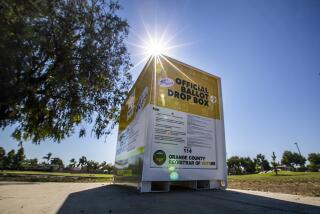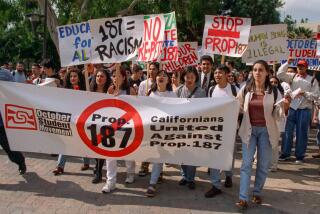Democratic Fortunes Don’t Hinge on the Unregistered : Democrats: The key is equal access and party identity, not expensive registration drives.
There is a persistent myth floating around Democratic Party circles that if we could only register the growing army of citizens eligible to vote, but unregistered, we’d finally start winning elections for President and governor.
An appealing theory, on the surface. After all, anywhere from 20%-30% of those eligible to vote in California fail to register. Many are low-income ethnic minorities. In 1990, for example, 5.7 million eligible Californians didn’t register or vote for governor.
There are two problems with this theory. First, it falsely presumes that the vast majority of unregistered citizens would vote Democratic. But young people, for example, who constitute one of the largest blocs of the unregistered, increasingly tilt Republican. Second, Democrats don’t work in a vacuum. Democratic registration efforts are increasingly matched by those of the Republicans.
The facts:
-- The CBS News/New York Times postelection poll of November, 1988, revealed that 50% of non-voters (including non-registrants) would have voted for George Bush; only 34% would have supported Michael Dukakis. Analysis showed that if turnout among blacks, Latinos and the white poor had all been 20 points higher in every state Bush won, Dukakis would still have lost 320-218 in the Electoral College.
-- Registration drives drain scarce party resources and divert attention from our real task: persuasion and get-out-the-vote. It costs a minimum of $6 to $7 to register each voter--and sometimes much more. In terms of a statewide campaign budget, it takes $1 million to register 150,000 voters, money that could be spent to educate and persuade the millions of previously registered voters who stay home.
Every election year, we spend money to register Democrats; Republicans spend money to register Republicans. But the Republicans have more money. Continuing this registration war isn’t going to win more elections for Democrats--it’s only going to deplete our treasury.
What is the answer?
-- Equal access . We must work with our Democratic Legislature and Congress to pass legislation to make it easier for historically disenfranchised groups to register--either at government agencies like the Department of Motor Vehicles or at polling sites on Election Day, or both. That will put the financial burden for administering elections where it should be--with the government.
-- Identity . Democrats must clearly distinguish themselves from Republicans. We must persuade potential supporters that Democrats will actually make their lives better, and get them to vote.
Take Minnesota: The state, which allows voter registration at the polls on Election Day, has for years led the nation in registration and turnout. Democrats have long held a registration edge there. Despite that, Minnesota has had two Republican senators since 1978. This year Democrat Paul D. Wellstone--with virtually no money--defeated the well-financed incumbent, Republican Rudy Boschwitz.
Wellstone didn’t need to register more voters. He crafted his message of change in a clear and compelling manner. Voters got the message.
More to Read
Get the L.A. Times Politics newsletter
Deeply reported insights into legislation, politics and policy from Sacramento, Washington and beyond. In your inbox three times per week.
You may occasionally receive promotional content from the Los Angeles Times.










